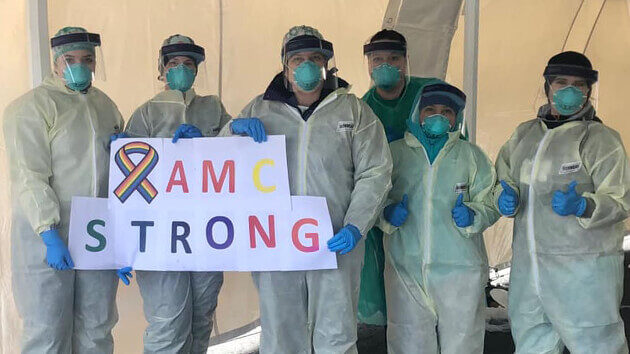The Sun Also Rises: One-Year Anniversary of Global Pandemic Sees Hope, Good Health on Horizon

On March 9, 2020, Albany Med convened Incident Command—an operational structure that all staff are familiar with by now. The Medical Center had been studying the spread of coronavirus in other parts of the world. Its forward march was rapid and, within days, arrived in New York. Today, Incident Command crosses the one-year mark of its activation.
The cascade of events in that year’s time will be emblazoned in our memories forever—some as moments, others a blur of change, isolation and profound darkness. We carefully tracked rises and declines in Covid-19 hospitalizations and community cases. Holiday gatherings were canceled. Handshakes and hugs were awkwardly deferred. So became a “new normal” no one hoped would be permanent.
Then, a sign that it wouldn’t be. The first coronavirus vaccines, reported to be 95 percent effective, were authorized for use by the U.S. Food and Drug Administration.
Something other than the number of cases began to rise. It was hope.
“It was miraculous,” exclaimed Dennis Metzger, PhD, professor and chair of Immunology and Microbial Disease at Albany Medical College. “We needed to do this, and all efforts were put towards developing this vaccine as quickly as possible. It was tested on 70,000 volunteers, and safety and efficacy were promptly established.”
Hospital employees were the first to be vaccinated according to state guidelines. The atmosphere at the clinics was uplifting—friends catching up, sharing thoughts of gratitude for the great minds of science. Cheer, at times, turned to tears—of happiness and a bit of closure. A resurrection of emotions some of us suppressed had surfaced—the kind we all at some point would have shared in the company of others. The vaccine promised we could again.
Anatoly Sosnovsky, RN, cared for Covid patients in the medical intensive care unit. He was standing in line on the first clinic day at Albany Med—Dec. 14, 2020.
“Ours was the first unit to be designated a full Covid ICU,” Sosnovky said. “It was physically and emotionally difficult. Even before the vaccine came to Albany Med, I knew I wanted to get it. The risk of being sick with Covid and potentially exposing someone is a greater threat than any possible side effects. We are beginning to see fewer patients on my unit, and I think that’s because of the vaccine.”
As hospitals were beginning to vaccinate employees, New York Governor Andrew Cuomo appointed 10 regional health care systems to oversee vaccine distribution. Albany Medical Center was chosen to lead the Capital Region Vaccine Network, charged with efficient and equitable distribution across Albany, Columbia, Greene, Rensselaer, Saratoga, Schenectady, Warren and Washington counties.
“A new day dawned in our fight against Covid,” said Albany Med President and CEO Dennis P. McKenna, MD, ’92. “The same staff that valiantly protected and healed the community from the virus would also administer the next phase. The task is monumental. But we made history on the front lines of the pandemic. We shall make history overcoming it.”
The vaccine network quickly convened a task force of local leaders in health care, business and the community to pool resources and strategize distribution. Within the network was also formed a Health Equity Task Force to focus on outreach, education and distribution to at-risk and historically underserved populations. Data suggests minority populations have greater concerns about the vaccine and face physical obstacles to receive it.
“We want to give our communities an opportunity to talk about those concerns, so we can overcome those concerns with facts,” said Micky Jimenez, regional director of Capital District Latinos, who was vaccinated at Albany Med’s community clinic. “So many of us know someone who has been affected by Covid. It hits home. If people in a neighborhood see others who have received the vaccine, they see that no one will be left behind. With this, and respect for cultural sensitivities, we will build trust.”
Currently, supply and demand dictate the pace of vaccine distribution, but they have no effect on the network’s mission to vaccinate every Capital Region resident. In February, Albany Med and Albany County collaborated with the Center for Disability Services and the New York State Industries for the Disabled to allocate doses for individuals with intellectual and developmental disabilities. The vaccine network hopes the clinic—and the collaboration—serve as a statewide model for populations that may not be best served at large-scale distribution centers. The network has also received a pledge of support from Albany Med, CDPHP, MVP Health Care, Irving Tissue, KeyBank, the United Way of the Greater Capital Region and Community Care Physicians, PC to underwrite a vaccine awareness campaign. The campaign urges everyone, “Don’t Hesitate. Vaccinate.”
The vaccine is safe. When enough of us receive it, we can remove the mask that hides the smiles we long to share and allow us to visit our relatives and friends, with the biggest hugs they have ever felt.
“To be a good citizen means to be protected from Covid-19,” said Internal Medicine Program Director Raymond Smith, MD. “Vaccination is the only way to stop the spread.”